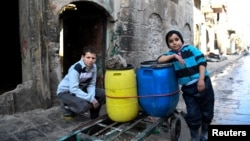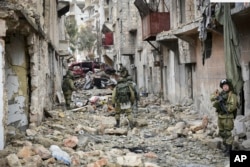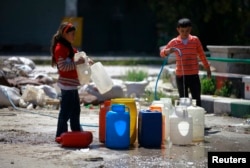The U.N. Children’s Fund reports repairs to a vital water source in the northern Syrian city of Aleppo are under way. UNICEF says safe water is slowly returning to the battle-scarred city, where almost two million people have been deprived of water for nearly one month.
There is little good news to report from Aleppo, especially the eastern part, which was subjected to months of brutal and intensive aerial bombardment by the Syrian government and its Russian ally.
And, the bad news continued when a public water network was deliberately cut off in mid-January, leaving 1.8 million people without a safe source of water; but, since the fighting has ended, some good news has come in that repairs to the municipal system are going ahead.
While water service is slowly resuming, spokesman for the U.N. Children’s Fund Christophe Boulierac says it will take about 10 days before water can be pumped regularly to all neighborhoods.
“Children have been hit hardest by the cuts," he said. "They are the most vulnerable to waterborne diseases and they bear the burden of collecting water. Currently, right now in Aleppo children are forced to queue at wells and distribution points for hours while the city continues to experience random shelling.”
Boulierac tells VOA children also are threatened by unexploded ordnance, a deadly legacy from years of fighting in the city.
“In December, six children in east Aleppo died while mistakenly playing with unexploded ordnance. Many others were injured. In these neighborhoods, many buildings have been destroyed and the risk of unexploded ordnance and war remnants and of destroyed buildings still constitute a major risk to children’s lives as people continue to go back to their homes there,” he said.
UNICEF says all parties to the conflict in Syria have used water as a weapon of war during nearly six years of conflict. It says they have resorted to contaminating water sources, damaging equipment and pipes, withholding fuel to power water pumps or as in the recent case of Aleppo, deliberately cutting people off from the public pumping station.
Boulierac says UNICEF is helping to repair groundwater wells, and every day it trucks 10 million liters of water to the most vulnerable children and families in Aleppo.











